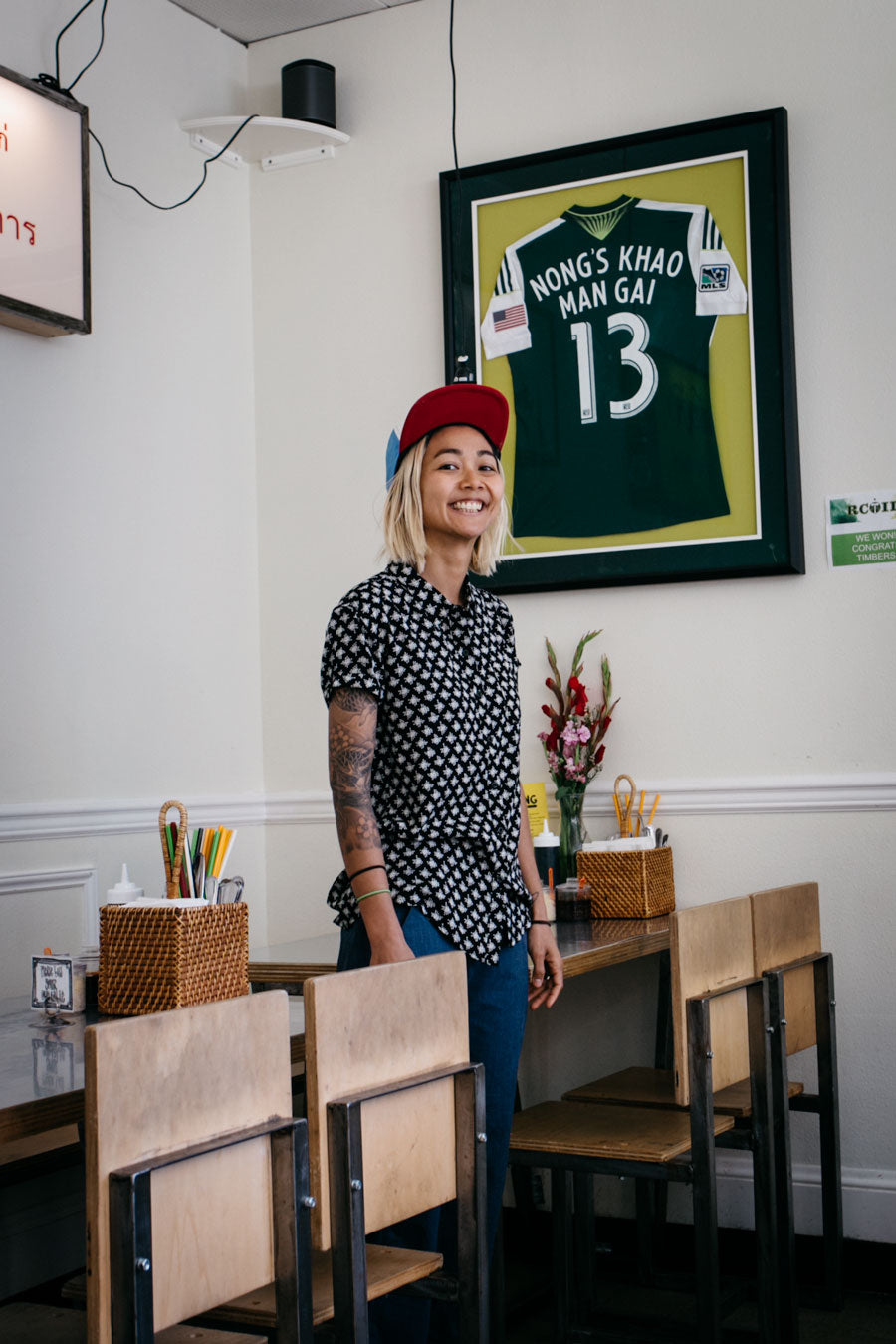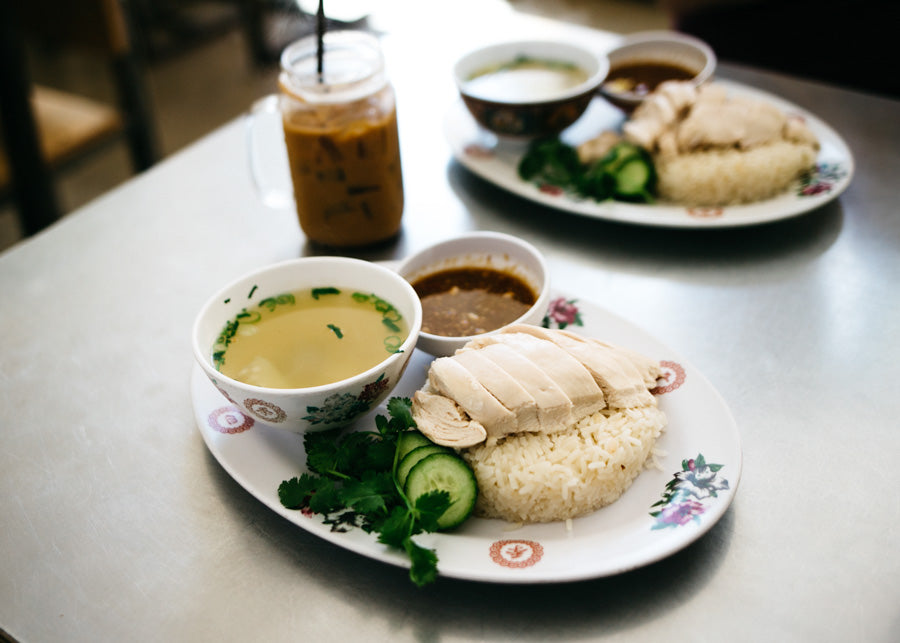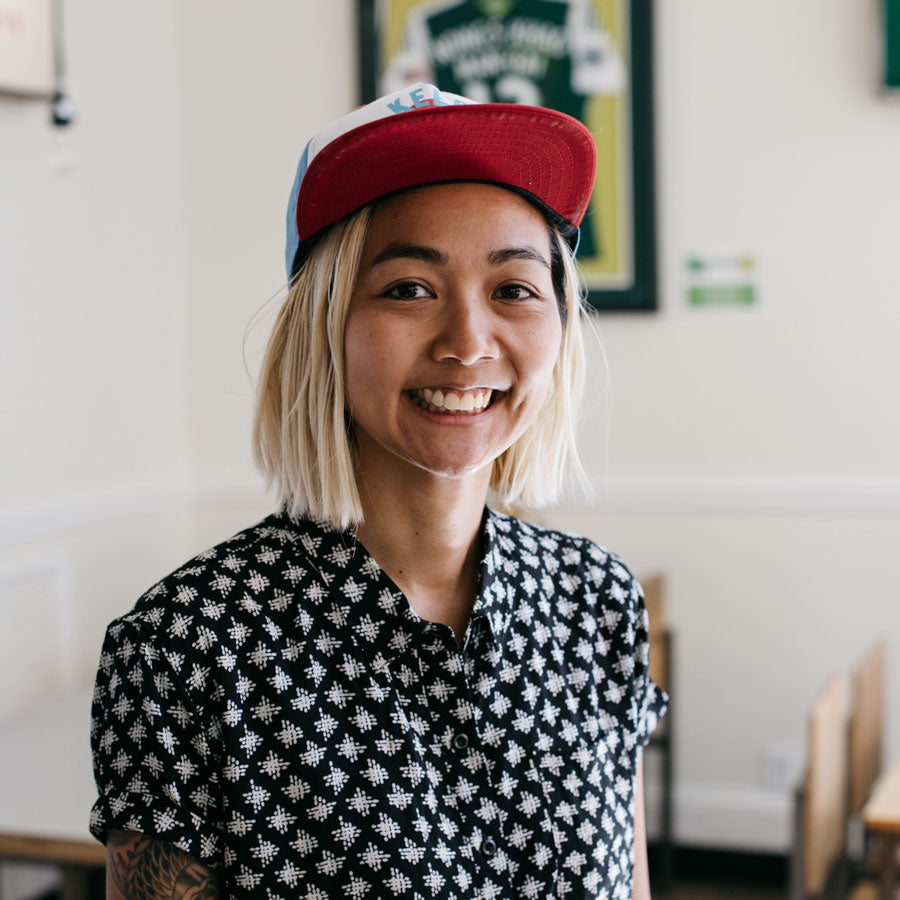Creating Bridge & Burn required a leap of faith. Founder Erik Prowell quit his job as a software developer, lit the proverbial match, and threw it—burning the bridge of working for anyone else behind him. With no formal training, he trusted his smarts and his strong work ethic, and took the plunge. In that spirit, Bridge Burners is a series showcasing people who are taking a similar leap. Most people under 40 are lucky if they’ve taken even one significant leap in their career. Nong Poonsukwattana—the woman behind Portland’s famous Nong’s Khao Man Gai mini-empire of food carts, a restaurant, and bottled sauce—gets at least double the credit, having not only undergone the difficult transition as an immigrant to the United States from her native Thailand, but having launched herself as a successful entrepreneur in her adopted home. The combination of those factors, including overcoming barriers of language and culture, mean that her continuing struggle has been long and extremely hard won.
Most people under 40 are lucky if they’ve taken even one significant leap in their career. Nong Poonsukwattana—the woman behind Portland’s famous Nong’s Khao Man Gai mini-empire of food carts, a restaurant, and bottled sauce—gets at least double the credit, having not only undergone the difficult transition as an immigrant to the United States from her native Thailand, but having launched herself as a successful entrepreneur in her adopted home. The combination of those factors, including overcoming barriers of language and culture, mean that her continuing struggle has been long and extremely hard won.
Nong grew up in Bangkok, where she suffered as the daughter of an abusive, alcoholic father. “He never had a job,” she remembers. “People in my neighborhood would insult me because of my dad. I told myself, ‘You know what? I can’t end up here. I have to make a better life for myself.’” Luckily, Nong’s mother, a chef, was able to put her kids through college, and her daughter grew determined to repay that gift by becoming successful enough to offer her support.
It proved to be a road riddled with setbacks. Nong’s first strategy was to become an airline stewardess for a Japanese company, but to her humiliation, she failed the training. Instead, she ended up moving to Portland on a fiancé visa (the relationship has since ended). It was April of 2003, she was 23, and it was her first time leaving Thailand.
Upon arrival, Nong went to work immediately serving in restaurants, one of three people living in a one-bedroom apartment. Her first gig was at the now-closed Grand Buffet on SE 82nd, and the bus ride to and from it was all she effectively knew of her new city. She remembers feeling cold all the time, and being amazed at the portions of food at Shari’s. (“Holy shit, the bacon is so big!”)

Though it would be years before Nong went into business for herself, she had already begun formulating a vision. Learning by observation as she cycled through “all the Thai restaurants in town,” Nong realized that in order to succeed in the food business, she would also need to differentiate herself. In Bangkok, khao man gai, or chicken and rice, is omnipresent—she compares it to pizza—and it’s common for a food vendor there to focus on only one specialty. It’s also a dish that isn’t overly challenging to the American palate, and nobody in Portland was already doing it. She began training herself to make the best version she possibly could, scouring stores to experiment with the best ingredients needed for the four components: chicken, rice, sauce, and soup. She not only wanted to impress her American customers; she was shooting for the level of quality that would ensure that even in Thailand, “mine would be the one to sell out first.”
Nonetheless, without capital or connections, Nong’s dream was elusive. “I just kept working at restaurants, hoping something would happen. I felt stuck,” she remembers. “I had only one American friend.”
An opportunity came in 2008, when Nong got a job as a line cook in the front-yard shack of Andy Ricker’s original Pok Pok. This was her first exposure to an American-run kitchen with a largely American clientele. “I had been living in America, but living in an immigrant environment,” she explains. “At Pok Pok I learned who my customer is, and how to communicate with them.” At the same time, the Thai pop music that is a signature of the restaurant’s atmosphere reconnected her to her roots. Though as a university student it was a style she hadn’t been exposed to often—it’s considered music for the hoi polloi of the working class—in the context of her life in America, it spoke to her. “I was humbled. I was going to stay at Pok Pok for three months, but ended up staying for nine.”
The downside was that she was working for less money than her previous restaurant jobs. “I made nothing,” she says, “but I learned by watching, and I also learned confidence, and the bottom line was that they opened the door.” The end result of her efforts to save over the years since she’d left Thailand amounted to only $800. It wasn’t enough to open a restaurant, but she’d already decided to do something different.

Finally, Nong made her move, buying a kettle corn food cart off of Craigslist. It was another rocky start. The seller reneged on the original price, and she ultimately had to fork over several hundred dollars more than she had anticipated. Then, upon arrival she discovered that it was filled to the brim with molding bags of old kettle corn that it was up to her to dispose of. Still, she was on her way, and Ricker allowed her to use the space next to Pok Pok to fix it up, connecting her to resources like a carpenter and an electrician who insisted she defer his payment until she had the business on its feet.
It was 2009 when Nong’s Khao Man Gai opened that first cart on SW 10th and Alder, and even then it was an uphill battle. “It was scary,” she remembers. “I was alone on the street.” Some days she would make only $40, and those were the days she would cry. She began educating herself about business via the internet, waking at 6 am to study, getting the cart open by 11, then dragging home dishes to wash in her apartment above the Matador. At the end of the day she would sleep so exhaustedly that she didn’t even realize she was living above a bar. She told herself that if it didn’t work out this time, she would “go back and be a waitress for another five years.” There was little question that she would keep trying.

Finally, a reporter from the Oregonian materialized, setting off the storm of positive press that catapulted Nong into position as one of the darlings of the city’s food scene. “Everything went ‘boom,’” she remembers, “and I started to get invited to events, and didn’t have clothes for them. Everything smelled like khao man gai! I didn’t know what to say to people. I had been a loser for a long time. I didn’t have any social skills. Zero. I would remember your faces and your orders.”
Since then, Nong has continued to expand, opening a second cart plus a brick ’n’ mortar location. She also realized one of her longstanding dreams: to have a product, her sauce, sold in stores. You can buy it in New Seasons, Oregon locations of Whole Foods, Uwajimaya, Food Front, Seattle’s DeLaurenti, the Brooklyn Kitchen in New York, and more, but it’s proven a challenge to take it to the next level without compromising the quality.
Now that she’s achieved a measure of success, Nong is trying to cultivate some much-deserved peace of mind. She remembers that, in the urban jungle of Bangkok, nature and recreation were things she thought only existed in magazines. When she reached a point where she could rent a place for a couple hours to take care of her dishes properly, it happened to be near a rock gym. “So I would wash dishes and then go climb. I was terrible at it, and I was tired. Sometimes I would pass out there. Everyone at the gym said I should get my strength up, and then they would take me out to climb. Three years later, I went out for the first time, and now I live the life in the magazines. The feeling changed me. It’s so powerful, and it changed how I see the world, and beauty, and life. It teaches me good things.”
With 40 employees, Nong has also had to teach herself how to be a leader, and that means taking enough care of herself that she’s able to make good decisions. She doesn’t have to, but she prioritizes providing her staff with medical and dental insurance, and is devoted to continued learning about how to run a business. “I try to focus on my core first, and go from there.”
Nong plans to open one more restaurant in Portland by next year, and if all goes well, another restaurant outside the city will come next. Her struggle to survive and succeed is still underway, even as it’s grown less dire by some measures. In the meantime, she has become someone other entrepreneurs, especially other immigrant entrepreneurs, can look up to. “My advice is, you just do it,” she says. “You’re going to hear a lot of ‘No’ and there are always going to be bigger problems ahead of you. When you see people who are successful, don’t think it fell from the sky. It’s a hard journey.”
Written by Marjorie Skinner.








